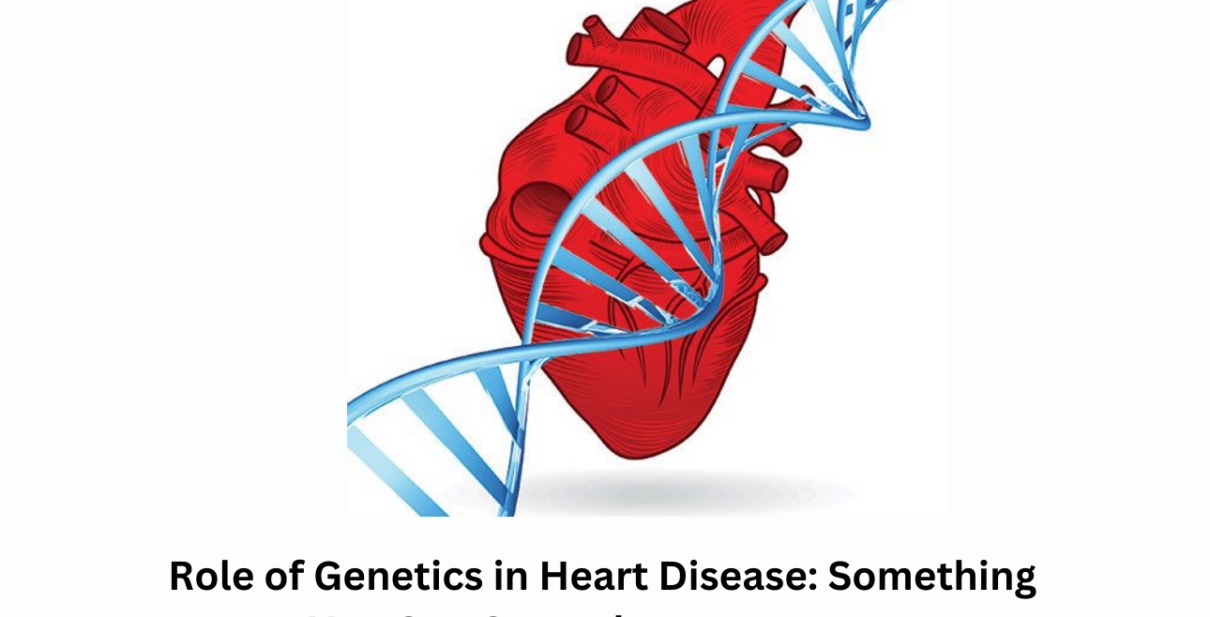Cardiovascular disease is perhaps the leading cause of death in human history. Heart disease mostly relates to the heart due to its blood supply condition. The risk factors mostly relate to genetic predispositions, which determine your risk once it runs in your family. However, while you can’t change your genetic makeup, there are numerous factors within your control that can significantly reduce your risk. Understanding the interplay between genetics and lifestyle choices is crucial for maintaining a healthy heart and preventing cardiovascular complications.
The Genetic Connection to Heart Disease
Your genetics determine much about your physical health, including how your heart and blood vessels function.
Genetic factors can influence:
Cholesterol Levels: Some people are born with a condition called familial hypercholesterolemia, which causes them to have very high cholesterol levels.
Blood Pressure: High blood pressure, or hypertension, can be inherited.
Blood Clotting Disorders: Some people are born with conditions that make them more likely to develop blood clots, which can cause heart attack or stroke.
Heart Structure and Function: Congenital heart defects or structural abnormalities, such as hypertrophic cardiomyopathy, may be genetic.
If your parents or close relatives have been diagnosed with heart disease at a younger age, there may be a hereditary predisposition. Useful information can also be garnered from genetic testing and your family health history.
What You Can’t Control
While you have aspects of heart disease that are simply out of your hands-including your genetic inheritance-it doesn’t mean that the condition is a certainty. Instead, such factors point to a risk that can often be avoided with informed decisions and an active approach. Such risks that are out of your hands include:
Family History: A strong family history of heart disease will give you a heightened risk.
Age: Your risk increases with age.
Gender: Generally, men are at a higher risk of heart disease at an earlier age than women, though the risk evens out after menopause.
Ethnicity: Certain ethnic groups, such as South Asians, have a greater genetic predisposition to heart disease.
What You Can Control: Lifestyle Choices Matter
While genetics may set the stage, your lifestyle will play the starring role when it comes to whether that genetic risk becomes a reality. These are the factors you control to reduce your risk.
1. Adopt a heart-healthy diet
While diet plays a major role in heart health, even genetic predispositions to heart disease can be offset by making healthy choices. To care for your heart:
Eat more fruits, vegetables, whole grains, lean proteins, and healthy fats.
Reduce saturated fats, trans fats, and cholesterol which make the arteries plaque-causing.
Limit sodium intake to help regulate blood pressure effectively.
A diet rich in omega-3 fatty acids, such as salmon, walnuts, and flaxseeds which help in maintaining healthy arteries.
- Physical Exercise
The heart will become stronger, and circulation improves. It will also maintain a healthy weight. In order to achieve this, one must engage in at least 150 minutes of moderate aerobic exercise per week, including brisk walking, cycling, or swimming. Strength training exercises can further enhance heart health by improving muscle function and metabolism.3. Maintain a Healthy Weight
Excess weight puts additional strain on the heart and increases the likelihood of high blood pressure, diabetes, and high cholesterol—all risk factors for heart disease. By maintaining a healthy weight, you can significantly reduce your genetic risk.4. Manage Stress
Chronic stress can trigger unhealthy habits like overeating, smoking, or excessive alcohol use. Practice stress-reduction techniques like meditation, yoga, or mindfulness to keep your heart and mind healthy.
5. Quit Smoking and Reduce Alcohol Intake
Smoking damages blood vessels, lowers oxygen in the blood, and greatly increases the risk of heart disease. Similarly, excessive alcohol intake can cause high blood pressure, arrhythmias, and other heart conditions. Chronic stress can trigger unhealthy habits like overeating, smoking, or excessive alcohol use.6. Keep Track of Blood Pressure and Cholesterol Levels
Regular health check-ups help detect and manage early risk factors. High blood pressure and cholesterol have no symptoms; they silently damage your heart over time. Work together with your healthcare provider to keep these levels within healthy ranges.7. Keep Track of Your Family History
Knowing your genetic tendency means you can be ahead. Talk to your doctor and consider genetic testing if cardiovascular disease is common in your family. Early detection of inherited diseases such as familial hypercholesterolemia gives appropriate time for intervention and possible treatment.The Evolving Role of Epigenetics
Epigenetics is a field of study that takes into account how lifestyle factors and environmental factors affect gene expression; thus, a person can be genetically predisposed to heart disease but still make lifestyle choices that may mitigate this risk. Your DNA sequence does not change, but diet, exercise, and stress management can “turn on” or “turn off” genes related to heart health. For instance:A well-balanced diet may shut off genes that are pro-inflammatory and pro-plaque.
Regular exercise can activate genes that promote cardiovascular resilience.
By making conscious lifestyle choices, you can influence the way your genes are expressed, potentially reducing your risk of heart disease despite a genetic predisposition.The Importance of Regular Screening
If you have a family history of heart disease, regular screenings become even more crucial. Common tests include:
Lipid Profile: To measure cholesterol and triglycerides.
Blood Pressure Monitoring: To detect and manage hypertension.
Tests: Blood Sugar Tests: major risk factor for heart diseases.
Electrocardiogram (ECG), Stress Tests: to review if he still has a functioning heart by checking for anomalies.
Earliest detection makes it even possible to take timely interference, which could prevent even complications and improved outcomes at the same time.
Taking Action: Genetics is Not Destiny
While your genes may predispose you to heart disease, they do not dictate your future. By focusing on controllable factors such as diet, exercise, weight management, and regular screenings, you can take charge of your heart health. Remember, prevention is always better than cure, and even small changes in your lifestyle can make a significant difference.
Conclusion
Heart disease may run in your family, but it doesn’t have to dictate your future. Understanding the role of genetics and adopting a proactive approach can help minimize your risk and promote a heart-healthy life. Combining awareness of your family history with positive lifestyle changes ensures that your genetic predisposition is well-managed.
For expert guidance, personalized prevention plans, and comprehensive heart care, consult Dr. Akshay Kashid, a cardiologist specialist based in Baner, Pune. His expertise in cardiovascular health can help you navigate your risk factors and maintain optimal heart health.



